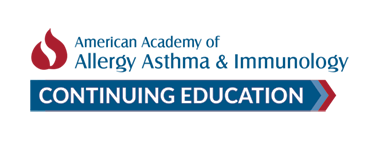Chemotherapy Hypersensitivity Reactions Assessment Using Telemedicine and Electronic Consultations
Over the past few years, enhanced technology has increased our opportunities to use telemedicine and improved our ability to care for patients at a distance. As COVID-19 has limited office visits, practices are pivoting to continue providing care to their patients and colleagues via telemedicine. This video lecture will be helpful to those who would like continue or begin collaborating with oncology and provide care to chemo patients who have reactions to chemo therapeutics and monoclonal antibodies.
This video lecture provides an overview of chemotherapy hypersensitivity reactions (HSR) assessments, including epidemiology and rates of reactions to chemo therapeutics and monoclonal antibodies. It explains the critical role that allergists play in evaluation and management of patients who have reactions and how this can be accomplished using telemedicine. Suggestions are given for how to start conversations with local oncologists to help those looking to expand their scope of practice using telemedicine.
Target Audience
- Allergist/immunologists
- Fellows-in-Training
- Physician Assistants and Nurse Practitioners
Learning Objectives
Upon completion of this activity, participants should be able to:
1. Describe the epidemiology and characteristics of common chemotherapy reactions
2. Identify actions allergists can take to help oncologists evaluate and manage patients who develop chemotherapy reactions
3. Outline key elements of conducting patient evaluations about chemotherapy and monoclonal antibody HSRs via telemedicine
Content Author
Aleena Banerji, MD FAAAAI
Massachusetts General Hospital, Boston, MA
Relevant relationships: None
Course Reviewers
David Khan, MD FAAAAI
University of Texas Southwestern, Dallas, TX
Relevant relationships: None
Samuel Gubernick, MD FAAAAI
Family Allergy, Asthma and Immunology Associates, Largo, FL
Relevant relationships: None
AAAAI Disclosure Policy
Pursuant to the Code of Ethics for the American Academy of Allergy, Asthma & Immunology (AAAAI) and the Standards for Commercial Support of Continuing Medical Education of the Accreditation Council for Continuing Medical Education, the AAAAI requires disclosure of certain information from faculty members of educational activities designated for CME credit by the AAAAI. Prior to the activity, authors and reviewers are required to disclose all relationships that meet the following parameters:
- Employment: Name of employer and job title.
- Financial interests: All organizations, other than the employer, from which the faculty member or a member of his/her immediate family or household receives annual remuneration in any amount (including grants, honoraria and consulting fees).
- Research interests: All organizations which support research projects for which the faculty member or member of his/her immediate family or household serves as an investigator.
- Legal Consultation Services/Expert Witness Testimony: All topics on which the faculty member provided legal consultation and/or expert witness testimony during the previous calendar year.
- Organizational interests: All organizations, other than the AAAAI, for which the faculty member holds volunteer positions.
- Gifts: All organizations from which the faculty member or a member of his/her immediate family or household have received a gift of any amount in the last year.
- Other interests: All interests of the faculty member or a member of his/her immediate family or household that would be judged by a majority of his/her peers to be more than casual and/or likely to impact his/her ability to exercise independent judgment. This includes any financial interest in or relationship with any manufacturer of a commercial product, and any financial interest or relationship with any organization that provides commercial support to AAAAI-sponsored educational activities.
The information disclosed by the speakers and planning committee was reviewed in accordance with the AAAAI Disclosure Policy. All potential conflicts of interest were resolved by the planners, faculty, and reviewers prior to their participation in the development of this activity.
Accreditation Statement
The American Academy of Allergy, Asthma and Immunology (AAAAI) is accredited by the Accreditation Council for Continuing Medical Education to provide continuing medical education for physicians.
Designation Statement
The American Academy of Allergy, Asthma & Immunology designates this enduring activity for a maximum of 0.50 AMA PRA Category 1 Credit™. Physicians should claim only the credit commensurate with the extent of their participation in the activity.
Credit Claiming Period
Credit claiming for this activity will expire at 11:59 pm on June 10, 2022. Requests to claim credit on or after June 10, 2022 will be denied.
Medium and Method of Physician Participation
Follow these steps to complete the activity:
- Register for the activity.
- Review the information in the Faculty and Accreditation tabs.
- Click Begin (from the Overview, Register, or Begin tabs).
- Take the pre-test.
- Watch the video lecture.
- Complete the post-test. You must achieve a score of 70% or higher to claim credit.
- Complete the activity evaluation.
- Claim your credits.
- Print or save your certificate.
AAAAI Privacy Policy
To verify your participation in educational activities, you may be asked to provide your name, contact information, and/or other descriptors. The AAAAI will not release this information to outside entities. It may be used internally to inform you of other AAAAI educational activities. If you wish to have your information excluded from this process, please contact us at [email protected].
Questions
All questions should be directed to [email protected].
Available Credit
- 0.50 AttendanceAttendance credit.
- 0.50 CMECME credit.

 Facebook
Facebook X
X LinkedIn
LinkedIn Forward
Forward